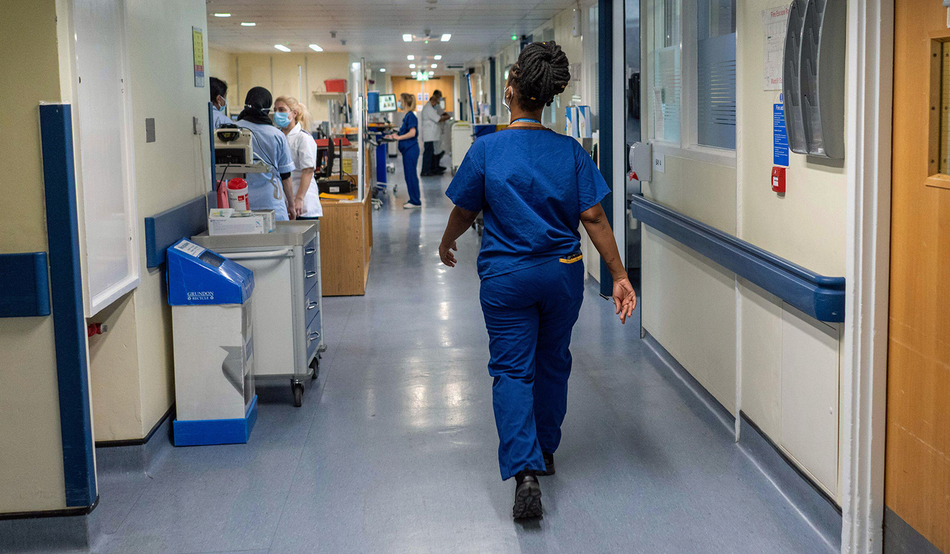When Dinesh*, a young Nepalese man living in England, began to feel sick a few months ago after developing a hernia, he did not seek medical attention.
Everyone in England, Scotland and Wales is legally entitled to primary healthcare, which includes free GP appointments. But as an undocumented person, Dinesh worried that asking for care could expose his immigration status and leave him vulnerable to being reported to the Home Office.
“There was a fear inside me that they might inform the police and I could get deported, and all I want is to stay, to be with my mum,” he said.
Dinesh’s experience is common. Across the country many undocumented migrants, asylum seekers and refugees are struggling to access healthcare at the first point of contact with the NHS—GP registration—after being turned away for not having ID or proof of address.
This issue has become the focus of campaigns by charities such as Doctors of the World UK (DOTW), an organisation which seeks to bridge healthcare gaps for vulnerable communities.
Those affected include many who may have been victims of persecution and violence in their home countries or on their journeys to the UK.
The refusal to enrol those unable to provide proof of identity or address occurs despite NHS England, NHS Scotland and British Medical Association (BMA) guidelines explicitly stating that these are not “reasonable grounds” for denying registration. The same is true in Wales.
Evidence suggests such refusals are widespread. A study this year found that 71 per cent of GP practices examined in the West Midlands incorrectly stated at some point that registration was not possible without proof of identity or address.
A nationwide investigation conducted by the Bureau of Investigative Journalism in 2021 produced similar results. At a time when mass Covid vaccinations were being rolled out, it found that 62 per cent of GP surgeries would not register a patient without proof of address, identity or immigration status.
Valentina D’Orazio, policy and advocacy manager at DOTW, believes pressures on the NHS are a large part of the problem.
She said: “The system is extremely stretched and there’s an extremely high turnover of staff, so training gets lost and this leads to situations where receptionists and GP practices are unclear as to which kinds of documents they can and cannot accept.
“But there’s also a bit of stigma and bias in terms of a genuine lack of understanding as to why people may find themselves in certain situations, like without an address or without a passport, for instance.”
Fear is another major element. While, by their nature, precise statistics on undocumented migrants and their motivations for avoiding healthcare are difficult to compile, DOTW reports that factors including a fear of deportation have prevented some from ever seeking care for up to 30 years.
In January 2017, NHS trusts were required to routinely share patient data with the Home Office to aid efforts to identify irregular migrants. Although this policy was rescinded in 2018, anxieties and misconceptions persist, compounded by a hostile political atmosphere towards migrants.
Dinesh suffered a mental health crisis that led to him dropping out of university, and became undocumented when his student visa was cancelled. Amid this climate of hostility, he remained unwilling to risk seeking treatment even after learning he was still entitled to primary healthcare.
He added that were he to get sick again, he would do the same.
GP surgeries are only part of the picture. Many undocumented migrants, refugees and asylum seekers also struggle with accessing secondary treatment that is not deemed “urgent”, such as hospital appointments.
All refugees and asylum seekers have the right to free secondary care—specialist health services typically accessed after referral from a primary source such as a GP. In Wales, Scotland and Northern Ireland, this also includes those whose asylum applications have been refused. However, this right does not extend to undocumented migrants, who are treated as overseas visitors and consequently charged a tariff of 150 per cent of what their secondary treatment costs. The details of those who do not repay debts of more than £500 to the NHS within two months are often passed onto the Home Office.
And there are other hurdles for asylum seekers and refugees. A 2022 paper found confusion within some hospitals about what documents asylum seekers and refugees must present to receive treatment, and about whether they need to pay.
Dr Poppy Pierce, a medical professional who has conducted research into the experiences of staff in maternity departments working with vulnerable populations, highlighted how pregnant women seeking antenatal care are particularly affected by this issue.
She said: “Policies and the changes in policies get embedded in healthcare systems and then there’s no proper communication when they’re changed.
“You’d still find people asking for passport details, immigration status,” she says, even after the policies that required such details had been abolished. Whether or not this happened was “entirely dependent on the culture at the hospital”.
“So a lot of people would just not come back or completely miss all antenatal appointments, and then only return when something’s gone wrong and they now need an emergency Caesarean and things like that, and that’s really dangerous.”
Dr Pierce also described a “threatening culture” within certain institutions. “Some hospitals are really receptive, but there are others where, as soon as you walk in, there are these big boards all about charging, all about what happens if you don’t own up or you don’t declare your status, and it’s just scary.
“The hospital is not the place for that. There’s really no place for that anywhere, but especially where people are vulnerable and seeking care that they urgently need.”
These barriers can have far-reaching consequences beyond the immediate need for treatment. Dinesh spoke of how his experience has had a lasting impact on his mental health, leaving him “paranoid”.
He said: “It was affecting my daily life, even at home, my routines.
“I started to feel like a prisoner in an open world because you never know when you will have an accident or get sick, and what could be worse than not being able to access healthcare?”
D’Orazio highlighted the safeguarding and public health risks that a lack of access poses, especially given that GP surgeries are places where those potentially suffering from abuse are identified.
She said: “It’s an issue on several levels: obviously for the person that can’t access the service, but also the healthcare system as a whole: it’s a huge lack of opportunities for early intervention and for prevention.
“In the long run, you’ll find a higher number of people that access emergency services when they have accumulated so many health needs that it takes a huge toll on NHS emergency services.”
Her colleague, Mélanie Delaroche, communications and engagement manager at DOTW, argued that one of the most damaging misconceptions is that migrants are attempting to exploit the system.
She said: “These are people who are incredibly vulnerable, who are already having a really hard time in the system and the environment in the UK, despite very much being integrated into our communities, who […] like everyone ever in their entire life, at some point, just need healthcare.”
The Department of Health and Social Care did not respond to a request for comment by the time of publication.
*Name has been changed to protect identity












